Nothing else really comes to mind for me, sorry.Is there anything else I should or can treat them with? Is there anything else water quality wise I should test that could be a cause?
Jay
Follow along with the video below to see how to install our site as a web app on your home screen.
Note: This feature may not be available in some browsers.
Nothing else really comes to mind for me, sorry.Is there anything else I should or can treat them with? Is there anything else water quality wise I should test that could be a cause?
Is it possible this can be ammonia and/or nitrite poisoning?? I did some testing and while the ammonia appears low, the nitrite are .50!! I'm not sure how this happened. Many fish have come and gone through this QT. I was doing some research and maybe I rinsed off my sponge too much. It is/was the only means of filtration in there. Is it possible I washed away all the beneficial bacteria and caused another cycle?Nothing else really comes to mind for me, sorry.
Jay
Is it possible this can be ammonia and/or nitrite poisoning?? I did some testing and while the ammonia appears low, the nitrite are .50!! I'm not sure how this happened. Many fish have come and gone through this QT. I was doing some research and maybe I rinsed off my sponge too much. It is/was the only means of filtration in there. Is it possible I washed away all the beneficial bacteria and caused another cycle?
At any rate, if this is in fact nitrite poisoning and the tank is cycling what can I do. The other QT is WAY too crowded at this point for these big bullies. I can maybe move the lady trigger to lighten the bioload, change out water for the third day in a row to try to dilute this nitrite. Any other suggestions?
My Hanna just read .49 for ammonia. The Tangs are still not eating and are just very lethargic. Breathing heavy, puffing their cheeks out. I wish there was something more I could do for them. I am thinking about pulling the trigger out into the other QT so it's just the two of them.Nitrite is completely non-toxic to marine fish (but deadly to FW fish). High nitrites shows that the ammonia is being converted, so that's a good thing.
Don't rinse your filter sponges too much, and never rinse them in anything but seawater - you don't want to wash the beneficial bacteria away.
Using a good ammonia test, with results less than 0.50 ppm is what you want to see.
Jay
My Hanna just read .49 for ammonia. The Tangs are still not eating and are just very lethargic. Breathing heavy, puffing their cheeks out. I wish there was something more I could do for them. I am thinking about pulling the trigger out into the other QT so it's just the two of them.
pH is reading 8.0. I'll do another water change. I'm making sure to keep plenty of rodi made and will change as much as necessary. I have a bottle of Microbacter StartXLM and API quickstart. Think it's a good idea to dose either of them to try to get my good bacteria going again>?At a pH above 7.8 or so, an ammonia reading of 0.50 is borderline of a major issue. Getting the ammonia below 0.25 (zero is best) would be a goal. If your pH is above 8.1, that amount of ammonia is really toxic.
Jay
Yes - unless you have some way to provide bacteria from an existing aquarium, the "bacteria in a bottle" is the best way to go.pH is reading 8.0. I'll do another water change. I'm making sure to keep plenty of rodi made and will change as much as necessary. I have a bottle of Microbacter StartXLM and API quickstart. Think it's a good idea to dose either of them to try to get my good bacteria going again>?
Ok. 50% water change and add bacteria. Anything I can do to maybe give them any temp relief? Also what do you recommend I do with salinity and temp?Yes - unless you have some way to provide bacteria from an existing aquarium, the "bacteria in a bottle" is the best way to go.
Jay
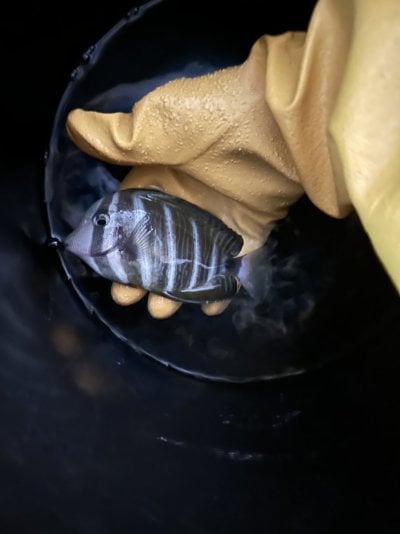
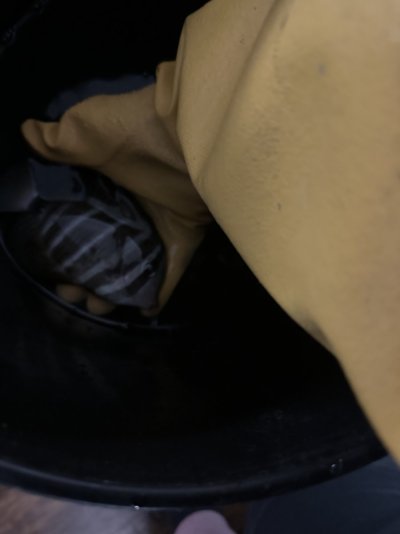
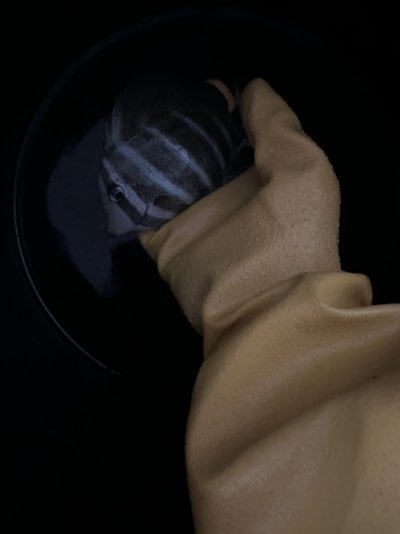
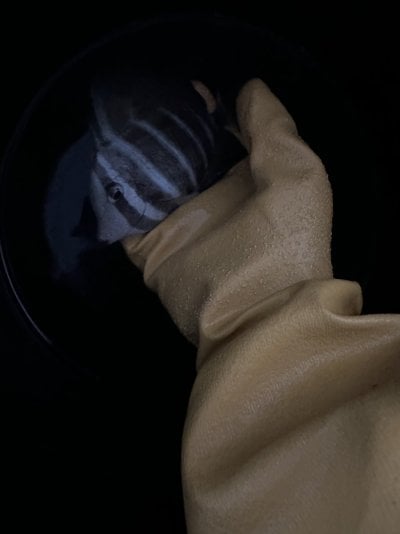
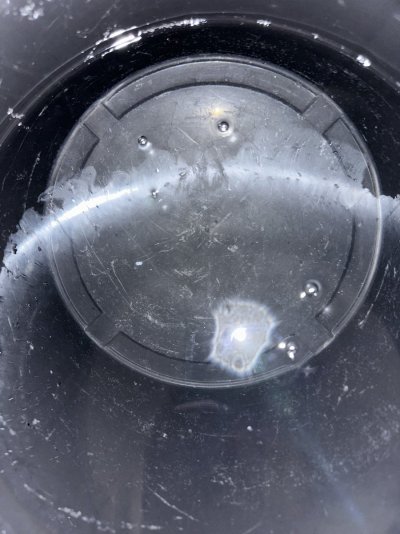
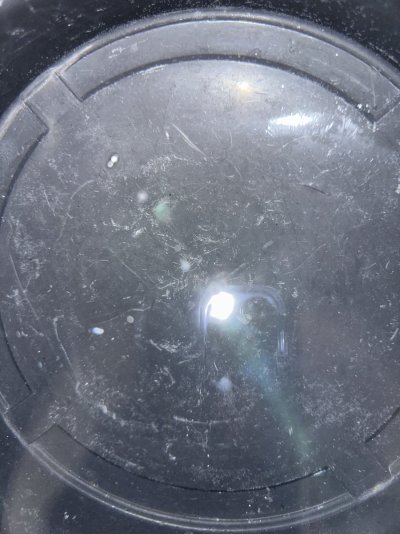
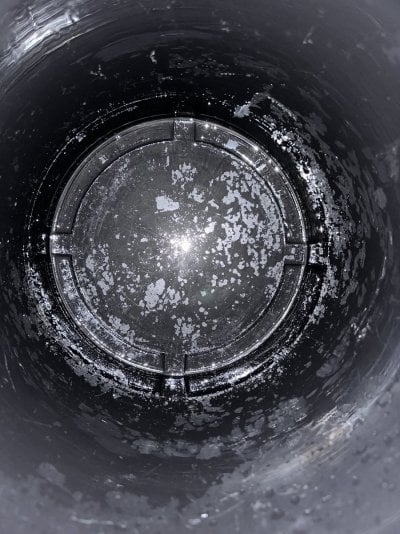
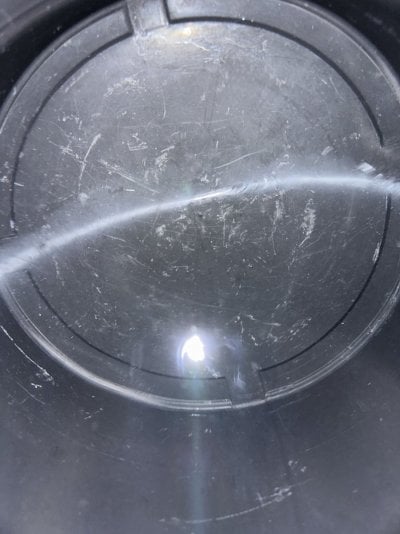
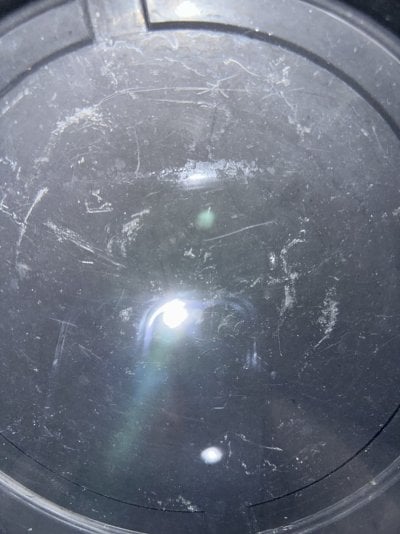
Ok cool. Yes, I dipped them one at a time in temp matched fresh water dip for 5 min or more each. They both got through it fine. They did lay down or do anything too crazy. I think they appreciated a bit of relief from whatever is ailing them. They are well seasoned fish that I got from the owners who needed to rehome them. They were very healthy and hardy when I got them so I'm hoping I can get them through this!Visually, gill flukes cannot always be told from protozoan diseases. I have a microscope, so would take a quick biopsy and know right away what it is. You are likely limited in that regard.
Did the fish get a full 5 minute dip? If so, they may be slightly improved today (but with severe flukes, there is always the chance that the dip will kill them).
Only one fluke species can be seen in dip water (Neobenedenia) and that is not a gill species.
Removing the copper if this is a protozoan would be a deadly mistake. Continuing with just copper if this is gill flukes would also be fatal. The fish have been hanging on for some time, but each day passing makes the likely hood of saving them more remote.
I would continue the copper and dose Praziquantel at 2.2 ppm twice, 8 days apart, with water changes (and redosing copper) as needed to control the ammonia.
Jay
Either Prazipro or Paracleanse will work, but for the latter, you need to ensure it mixes in well with the tank water.Ok cool. Yes, I dipped them one at a time in temp matched fresh water dip for 5 min or more each. They both got through it fine. They did lay down or do anything too crazy. I think they appreciated a bit of relief from whatever is ailing them. They are well seasoned fish that I got from the owners who needed to rehome them. They were very healthy and hardy when I got them so I'm hoping I can get them through this!
Should I dose prazipro or paracleanse? What do you think is safer with the copper power? Also... did you notice the sailfin's face? He looks pretty beat up above his left eye. Looks like he's scraped up or that something was attached and fell off like I've heard you mention in the past.
No, I can’t think of anything else to do. Prazi does not always give immediate relief - the flukes drop off, but that leaves holes in the fish’s gills and they continue to bleed. In severe infections that can be in itself fatal. Then, there is the question of secondary bacterial infection following flukes.Still no eating. Purple guy moving around a bit now but spent all day facing the corner. Sailfin was hiding in the cave all day but tonight found him laying on his side in the cave. I moved it and he flew out which was a relief but now he is laying on his side breathing as heavy as ever. Prazi has been going 24 hours and I really hoped to see improvement, but it's not looking great. Sailfin is showing a bit more pink/red in areas. Is there anything else that I could possibly do for them? I tried feeding a little brine but still no interest. He's a fighter but i just wish I could help this poor guy.
#fishmedics
Ok. I'll continue to monitor overnight and see where we are in the am. Or not. As I was typing this I got up to check and he has passed. I don't know if there is anything I can look for to try to see what this is to maybe better treat the purple. If it's something environmental i almost want to pull him from this QT tank and burn it. At the same time, I worry about whatever he has wiping out the other QT which all fish are doing great in right now.No, I can’t think of anything else to do. Prazi does not always give immediate relief - the flukes drop off, but that leaves holes in the fish’s gills and they continue to bleed. In severe infections that can be in itself fatal. Then, there is the question of secondary bacterial infection following flukes.
Jay
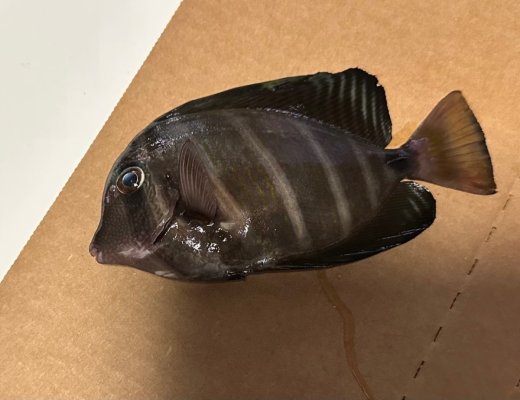
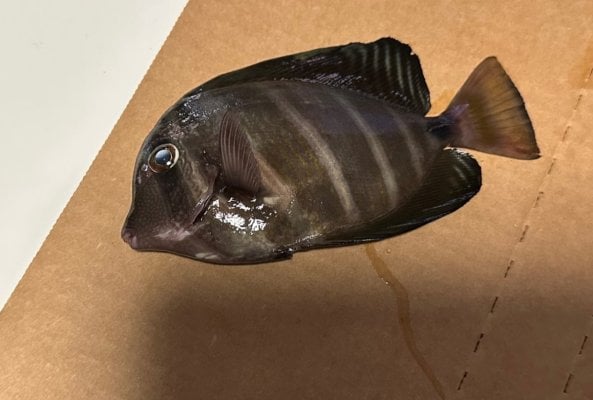
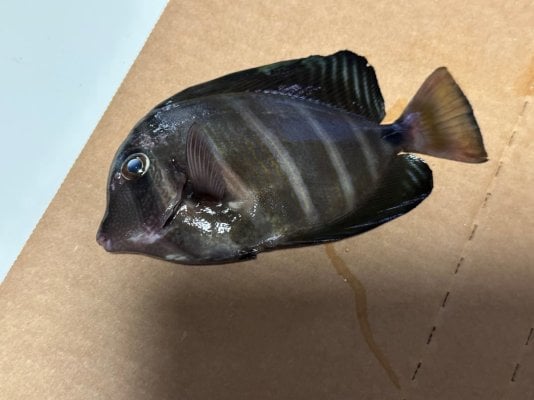
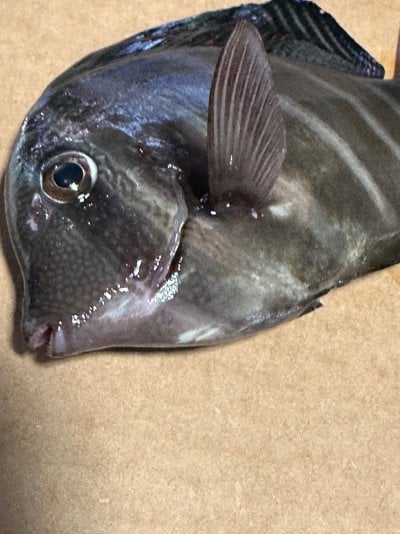
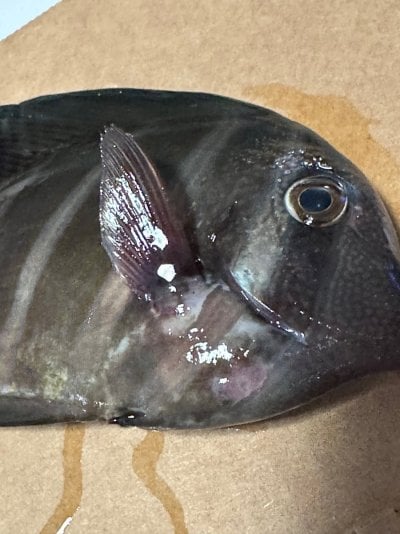
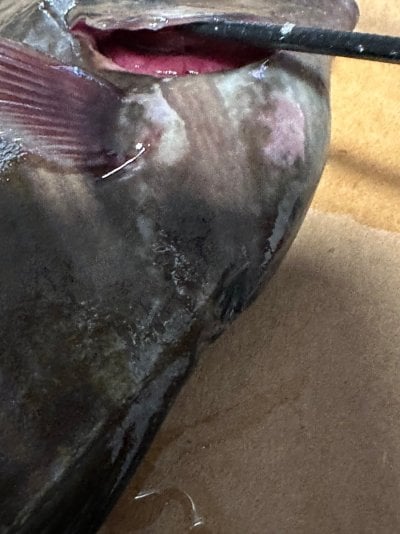
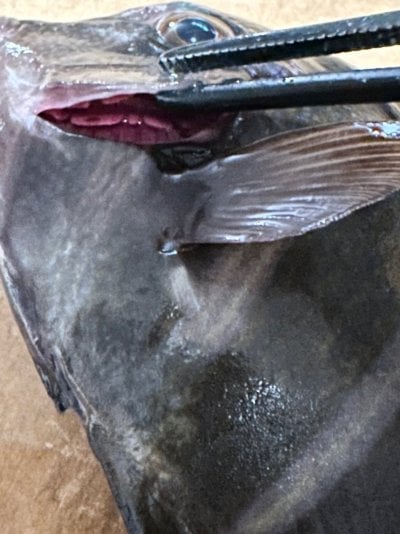
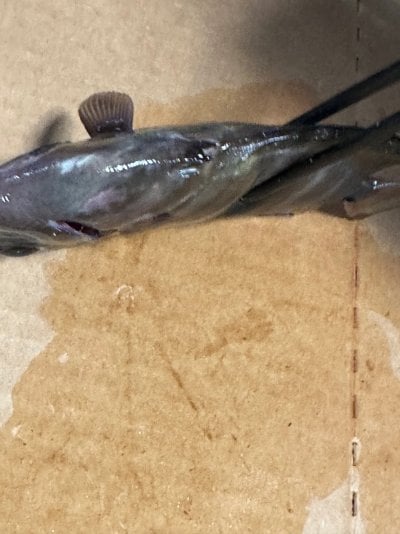
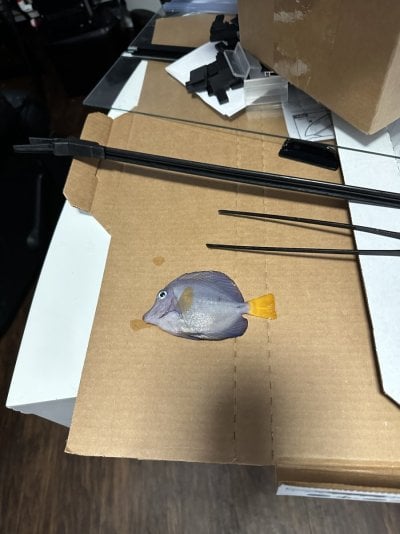
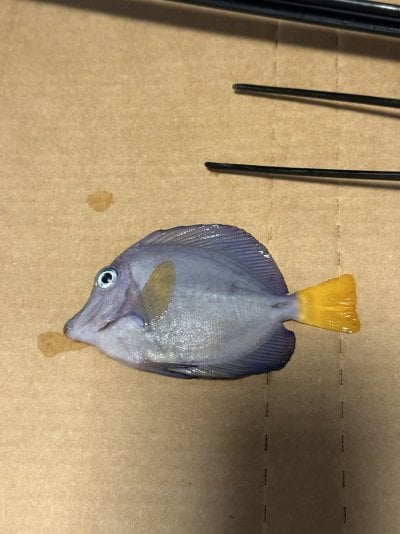
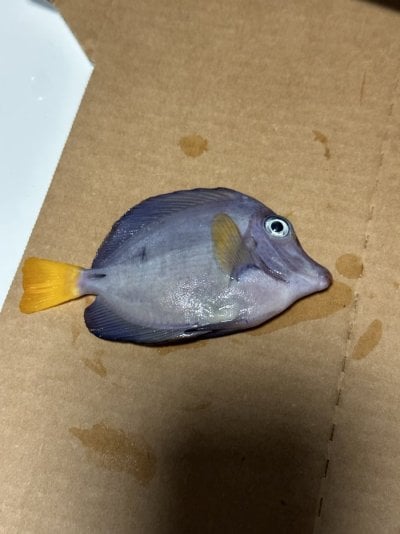
Ok. I'll continue to monitor overnight and see where we are in the am. Or not. As I was typing this I got up to check and he has passed. I don't know if there is anything I can look for to try to see what this is to maybe better treat the purple. If it's something environmental i almost want to pull him from this QT tank and burn it. At the same time, I worry about whatever he has wiping out the other QT which all fish are doing great in right now.







I left the purple guy in the bucket overnight to see if anything revealed itself but I did not see anything different. It could have been really bad flukes that upon falling off just left too much damage in their wake.Sorry to see!
I can see possible gill damage - the light pink color, mushy texture and the dark red spot. Of course, we already knew the fish had respiration issues, the question is WHY. Without a microscope we still can't say - water quality, bacterial, protozoan or flukes can all cause this......
Jay

